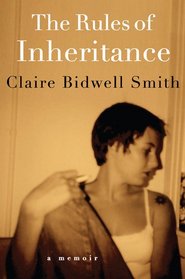Review first published on my blog: http://memoriesfrombooks.blogspot.com/2012/02/rules-of-inheritance.html
The Rules of Inheritance is the memoir of Claire Bidwell Smith. She is a licensed therapist specializing in helping patients through grief. This book tells the story of her very personal journey. She is an only child of loving parents. When she was fourteen, both parents were diagnosed with cancer. She lost both parents to the disease in the following few years. This book tells the story of her journey through tragedy.
The book is not a chronological story of what happened. Rather, it captures moments that depict Claire's passage through the various stages of grief. The five stages of grief are based on a model introduced by Elisabeth Kubler-Ross in her book, On Death and Dying. The stages are: denial, anger, bargaining, depression, and acceptance.
The structure of this book works well. The lack of chronology ceases to matter a short while into the book. The book has so few characters, and the story is punctuated by such major events that it is clear where each section is in the chronology of Claire's life.
This is not a pretty story. It is, however, a real one. It tells the story of regrets - things she wishes she had done or things she wishes she had told her parents while she had the time. An emotion we can all relate to. The book also tells the story of self-destructive behaviors she adopted to get through this time. Again, feelings and actions we can all relate to even if our choice of escape might be different. It tells the story of loneliness even when surrounded by people. Again, sometimes a universal emotional. It finally tells the story of hope and survival. Something we all need to believe in.
This book is not an easy read. But it is a worthwhile one. It provides a window onto this human experience in a captivating and heartfelt book.
***Reviewed for the GoodReads First Reads Program***
The Rules of Inheritance is the memoir of Claire Bidwell Smith. She is a licensed therapist specializing in helping patients through grief. This book tells the story of her very personal journey. She is an only child of loving parents. When she was fourteen, both parents were diagnosed with cancer. She lost both parents to the disease in the following few years. This book tells the story of her journey through tragedy.
The book is not a chronological story of what happened. Rather, it captures moments that depict Claire's passage through the various stages of grief. The five stages of grief are based on a model introduced by Elisabeth Kubler-Ross in her book, On Death and Dying. The stages are: denial, anger, bargaining, depression, and acceptance.
The structure of this book works well. The lack of chronology ceases to matter a short while into the book. The book has so few characters, and the story is punctuated by such major events that it is clear where each section is in the chronology of Claire's life.
This is not a pretty story. It is, however, a real one. It tells the story of regrets - things she wishes she had done or things she wishes she had told her parents while she had the time. An emotion we can all relate to. The book also tells the story of self-destructive behaviors she adopted to get through this time. Again, feelings and actions we can all relate to even if our choice of escape might be different. It tells the story of loneliness even when surrounded by people. Again, sometimes a universal emotional. It finally tells the story of hope and survival. Something we all need to believe in.
This book is not an easy read. But it is a worthwhile one. It provides a window onto this human experience in a captivating and heartfelt book.
***Reviewed for the GoodReads First Reads Program***




